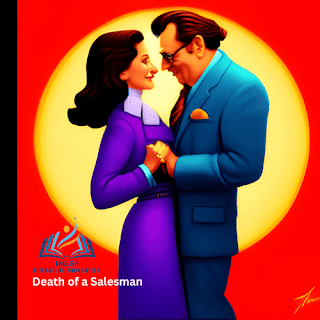Detailed summary of "Death of a Salesman" by Arthur Miller
Introduction
In this article, we will delve into a detailed summary of Arthur Miller's acclaimed play, "Death of a Salesman." With the help of important keywords searched in search engines and by quoting text from the play, we will explore the themes, characters, and overall significance of this classic work of literature.
The American Dream and Its Discontents
One of the central themes of "Death of a Salesman" is the American Dream and its inherent flaws. Willy Loman, a hardworking and devoted salesman, believes that success is achieved through charisma and being well-liked. He idolizes the idea of achieving wealth and popularity, but his pursuit of this dream leads to his downfall.
As Miller explores the American Dream, he highlights the unrealistic expectations society places on individuals. Willy's inability to achieve the success he desires creates feelings of inadequacy and self-doubt. The play serves as a critique of the capitalist society that often prioritizes materialistic values over human connection and personal fulfillment.
The Illusion of Success
Willy Loman's pursuit of success is rooted in illusion. He believes that being well-liked and having a charismatic personality is enough to achieve prosperity. However, this illusion is shattered when he realizes that popularity alone cannot guarantee financial security or happiness.
"No, no, there's more to it than that. I mean, you
can't eat the orange and throw the peel away - a man is not a piece of
fruit!" - Willy Loman (Act 2)
The Downfall of the American Dream
As Willy's dreams crumble, the play portrays the downfall of the American Dream itself. Willy's sons, Biff and Happy, also struggle to find success and meaning in their lives. The play raises questions about the viability of the American Dream in a society that prioritizes material wealth and superficial success.
The Tragic Hero: Willy Loman
Willy Loman serves as the tragic hero in "Death of a Salesman." He is a complex character with flaws and virtues, and his journey embodies the tragedy of the human condition.
Willy's Struggles with Identity
One of Willy's main struggles is his identity crisis. He yearns to be respected and admired, but he feels overshadowed by his more successful brother and the accomplishments of others. Willy's inability to accept his true self contributes to his downfall.
"I'm not a dime a dozen! I am Willy Loman, and you
are Biff Loman!" - Willy Loman (Act 2)
The Tragic Flaw of Pride
Willy's tragic flaw is his pride. He is unwilling to acknowledge his failures and shortcomings, which leads to a distorted sense of reality. Willy's pride prevents him from finding fulfillment and accepting the realities of his life.
The Loman Family Dynamics
The dynamics within the Loman family play a crucial role in "Death of a Salesman." The strained relationships between Willy, his wife Linda, and their sons Biff and Happy add depth to the narrative.
The Role of Linda Loman
Linda Loman, Willy's wife, is a loyal and supportive character. She is often caught in the middle of the conflicts between Willy and their sons. Linda's unconditional love for Willy highlights the complexities of family relationships and the sacrifices made in the pursuit of the American Dream.
The Rivalry between Biff and Happy
Biff and Happy, the Loman brothers, have a complicated relationship. Biff, the elder brother, is disillusioned by his father's false ideals and struggles to find his own path in life. Happy, on the other hand, strives to live up to his father's expectations, leading to a rivalry between the two brothers.
The Significance of "Death of a Salesman"
"Death of a Salesman" is a timeless play that continues to resonate with audiences today. Its exploration of the American Dream, the complexities of human nature, and the impact of societal expectations make it a thought-provoking and impactful work of literature.
Relevance in Today's Society
The themes addressed in "Death of a Salesman" remain relevant in today's society. The pressure to achieve financial success, the impact of societal norms on individual happiness, and the consequences of chasing unattainable dreams are all issues that continue to affect people's lives.
The Universality of Human Struggles
The play's focus on the universal struggles of the human condition makes it relatable across cultures and time periods. The characters' desires for love, acceptance, and purpose transcend the specific context of the play, allowing audiences to connect with their own experiences and emotions.
Symbolism and Motifs in "Death of a Salesman"
Miller skillfully employs symbolism and motifs throughout the play to deepen its meaning. The motif of seeds and planting represents Willy's desire for growth and success. However, the seeds never flourish, mirroring Willy's unfulfilled dreams and aspirations.
The house is another significant symbol, representing Willy's longing for stability and a sense of belonging. As his mental state deteriorates, so does the condition of the house, reflecting the disintegration of Willy's dreams and the disarray within his family.
Family Dynamics and Social Commentary
"Death of a Salesman" explores the complexities of family relationships and the impact of societal expectations on individuals. The strained relationship between Willy and his eldest son, Biff, is at the heart of the play. Biff's disillusionment and resentment towards his father stem from the false image Willy projected onto him.
Miller uses this familial conflict to comment on the destructive nature of unrealistic expectations and the damaging effects of pride and deceit within families. The play serves as a cautionary tale, urging individuals to value honesty, self-awareness, and genuine human connection.
FAQs about "Death of a Salesman"
What is the main message of "Death of a Salesman"?
A: The main message of "Death of a Salesman" is the disillusionment of the American Dream and the tragic consequences of pursuing unattainable ideals.
Who is the author of "Death of a Salesman"?
A: "Death of a Salesman" was written by Arthur Miller.
When was "Death of a Salesman" first performed?
A: "Death of a Salesman" premiered on Broadway in 1949.
Are there any film adaptations of "Death of a Salesman"?
A: Yes, "Death of a Salesman" has been adapted into multiple film versions, including the 1951 film directed by László Benedek and the 1985 television adaptation directed by Volker Schlöndorff.
What awards has "Death of a Salesman" won?
A: "Death of a Salesman" has received numerous accolades, including the Pulitzer Prize for Drama and the Tony Award for Best Play.
What is the
significance of the title, "Death of a Salesman"?
The title "Death of a Salesman" encapsulates the central theme of the play, as it symbolizes the demise of Willy Loman, both physically and metaphorically. The word "salesman" represents not only Willy's occupation but also his identity and sense of self-worth.
How does Arthur Miller portray the American Dream in
"Death of a Salesman"?
Miller critiques the American Dream in "Death of a Salesman" by exposing its flaws and the toll it takes on individuals. He highlights the unrealistic expectations society places on individuals and the detrimental effects of prioritizing material success over personal fulfillment.
Is "Death of a Salesman" a tragedy?
Yes, "Death of a Salesman" is widely regarded as a tragedy. The play follows the conventions of a tragic narrative, with Willy Loman as the tragic hero. His downfall is a result of his tragic flaw, and the play explores universal themes such as the human condition, the pursuit of dreams, and the nature of failure.
What are some other notable plays by Arthur Miller?
Arthur Miller has written several notable plays, including "The Crucible," "All My Sons," and "A View from the Bridge." Each of these plays delves into complex themes and societal issues, showcasing Miller's talent for exploring the human condition.
How does Miller use flashbacks in "Death of a Salesman"?
Miller uses flashbacks in "Death of a Salesman" to provide insight into Willy's past and the events that shaped his present reality. The juxtaposition of past and present emphasizes the gap between Willy's dreams and his actual achievements, highlighting the tragedy of his life.
What is the ultimate message of "Death of a
Salesman"?
"Death of a Salesman" conveys the message that pursuing material success at the expense of personal happiness and genuine human connections can lead to disillusionment and despair. It urges individuals to reevaluate societal values and prioritize authentic relationships and self-fulfillment.
Conclusion
"Death of a Salesman" by Arthur Miller is a powerful and thought-provoking play that examines the disillusionment of the American Dream and the complexities of human nature. Through the tragic journey of Willy Loman, Miller challenges societal ideals and raises profound questions about success, identity, and the pursuit of happiness. As audiences continue to engage with this timeless work, its themes and messages remain as relevant today as they were when the play was first written.

